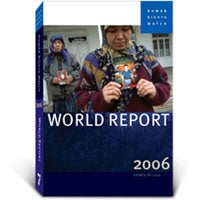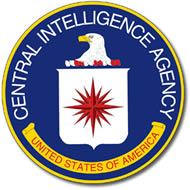
Human Rights Watch, an increasingly influential organization, has delivered its annual shame one, shame all-fest,
HRW Report 2006. It is making news for it's headline,
"U.S. Policy of Abuse Undermines Rights Worldwide," and for calling Iraq's situation
"much worse". HRW is somewhat unique in that it manages to really piss-off everyone - the Israeli's, the Palestinaians,
Americans, the Cubans and now Chavez appears increasingly in their crosshairs.
Maybe it's what NGO Monitor
says, just HRW's 'attempt to provide artificial political “balance.”' Or maybe its just the nature of these groups. They have to go country by country and call attention to something negative in a few paragraphs. I find it all very insightful as this type of liberal/NGO think (sans ideology) is the new global center.
The HRW 2006 Report focuses much of its effort on the developments in the United States. It calls "Inhumane Treatment and Torture" deliberate US Policy, and says US credibility in the defense of human rights has been "severely comprimised." It harshly criticizes illegal detentions at Gitmo and other undisclosed locations, as well as our incarceration rates (now highest in the world with blacks 7x more likely to be in jail), the death penalty, our HIV/AIDS policies, Katrina, imigration and our stance on international treaty and law obligations.
Here's what they say about some of our neighbors to the South:
Colombia: presents the most serious human rights and humanitarian situation in the world.... Members of the armed forces have been implicated with abuses... Impunity... remains a serious problem. Of course, this is a country where we pour $800 million a year in military assistance to those who
"support, and commit abuses in collaboration with members of paramilitary groups." The report notes a portion of this aid is supposed to be conditioned to human rights progress but this is not "consistently enforced."
Haiti: Haiti’s already bad human rights conditions worsened in 2005, its second year under an unelected interim government. Mark this another massive and devastating failure in Bush's gift of freedom to the world. The justice system is now "hardly functional" and politically motivated where it does "work." 2005 marked a year where a convicted mass-killer, Louis Jodel Chamblain was aquitted along with 15 former soldiers and paramilitaries already convicted for the Raboteau massacre. Hundreds of millions in US Aid funds that we had withheld from the popular Aristide Government prior to his ouster, now flow into the coffers of the junta-like Government that presides over this mess, while the poor (mostly Brazillian) UN force is now seen as the occupiers. The US and France bear direct responsibility for this state of affairs.
Mexico: Mexico's criminal justice system, meanwhile, continues to be plagued by abuses, and law-enforcement officials often do not investigate and prosecute human rights violators.. Vicente Fox's supposed reform efforts have not "lived up to its potential."
Cuba: remains a Latin American anomaly: an undemocratic government that represses nearly all forms of political dissent. Is IS an anamolly, having the best
educated, most
secure and cultured population in all Lat. Am./Car. Cuban
democracy, an evoloving process, is in many ways (like workplace and local government), very democratic and responsive. Participation is high and party affiliation is not important in local elections, who are directly nominated by the community. The President (Castro) is indirectly elected. Political dissent is rare. Though those who engage with enemy government financed groups have been arrested on occasion. A Cuban "human rights" group (who HRW quotes) estimates 300 "political prisoners," the majoroty of who were working for the US Government.
President Fidel Castro, now in his forty-seventh year in power, shows no willingness to consider even minor reforms. Castro has experimented with capitalist reforms only to see inequality grow too fast and corruption begin to rear its head. In 2004 and 2005 he back-tracked and re-asserted State control in most areas. As a result of increased foreign investment and efficiency gains, there has been a rapid increase in GDP (11.4%) in 2005. Also 2005 saw an even greater share of income being distributed to social programs, many workers and the elderly.
Instead, his government continues to enforce political conformity using criminal prosecutions, long- and short-term detentions, mob harassment, police warnings, surveillance, house arrests, travel restrictions, and politically-motivated dismissals from employment. HRW cites 11 criminal prosecutions of so-called "dissenters" in 2005, most under
Law 88, which punishes collaboration with the US Government. Those not working with the Americans have been relatively free to pursuse their aims. An "independent civil society" conference took place without harrassment and many (non US Government tied). There were a couple of incidents where it appears neighbors and activists took matters into their own hands and publicly denounced those they felt were being traitorous.
The end result is that Cubans are systematically denied basic rights to free expression, association, assembly, privacy, movement, and due process of law. They cite maybe 30 people arrested in 2005 on "political" charges. perhaps 50 people can say they experienced any kind of "oppression" in 2005 at the hands of the Cuban government. The recent arrest of a Florida University couple for "working for the Cuban Government" shows that the US does not tolerate similar working for enemy governments on its soil. Cubans enjoy rights to housing, food, health, jobs and education in their Constitution like few places in the world, which this "human rights" report ignores. People are free to pursue careers in the arts and sciences, free from drugs and crime and most other major social problems associated with "advanced" societies.
Venezuela:
Since winning a national referendum on his presidency in 2004, Hugo Chávez and his majority coalition in Congress have taken steps to undermine the independence of the country’s judiciary by packing the Supreme Court with their allies. I suppose the HRW considered the 2002 Supreme Court "independent" because it voted 11-9 to set free 4 military officers in charge of the coup-de-tat against President Chavez. They used the perverse lie that the action was a "power vacuum" and not a coup, which is demonstrably false. Since then, phone evidence surfaced that former Justice Minister Luis Miquilena, who had appointed most of the Justices, was talking to coup plotters about "putting pressure on the Supreme Court." Many tipped Miquilena to be the plotters favored President. Something clearly had to be done, particularly after the nation had demonstrated its huge support for Chavez and his other Constitutional reforms. More Justices were added to the court, as had been done in previous years by US-backed Menem in Argentina and and Fujimori in Peru. Hugo Chavez did not appoint anyone to the court... unlike in the US. The opposition in the Naitonal Assembly boycotted the proceedings, assuring a pro-Chavez tilt
They have also enacted legislation that seriously threatens press freedoms and freedom of expression. Not one media outlet has been closed or journalist arrested. This despite having one of the most gossip-filled, disrespectful, partisan (opposition), and lie-filled media in the world. They are talking about a law that had mostly to do with cleaning up sex and violence from Venezuelan television. The controvertial "descato" (disrespect) provision is common in many Latin countries and requires a very high standard of misconduct. The law is close to our libel laws.
Several high profile members of civil society have faced prosecution on highly dubious charges, and human rights defenders have been repeatedly accused by government officials of conspiring against the nation. Because they HAVE been conspiring against the nation and partipated in an exposed coup. Like those already found guity (and some innocent), those who don't run will receive a fair trial. If HRW is truly defending
Machado, Carmona and Poleo (see comments), they are woefully uninformed. Should the small "opposition"and foreign powers be allowed to bring down the most popular government in Latin America with impunity?













